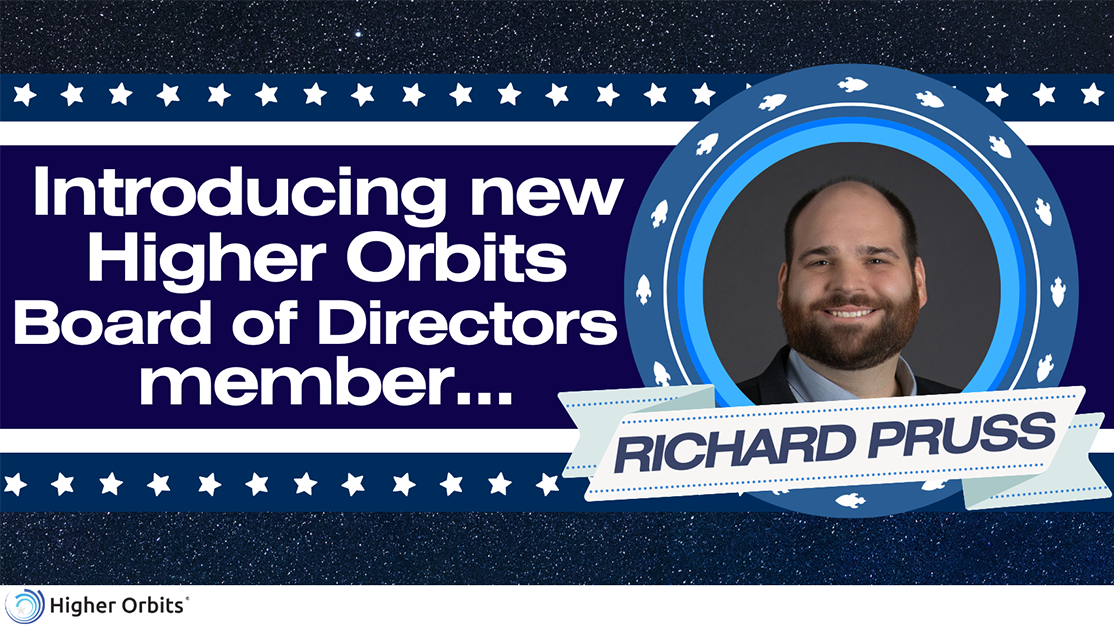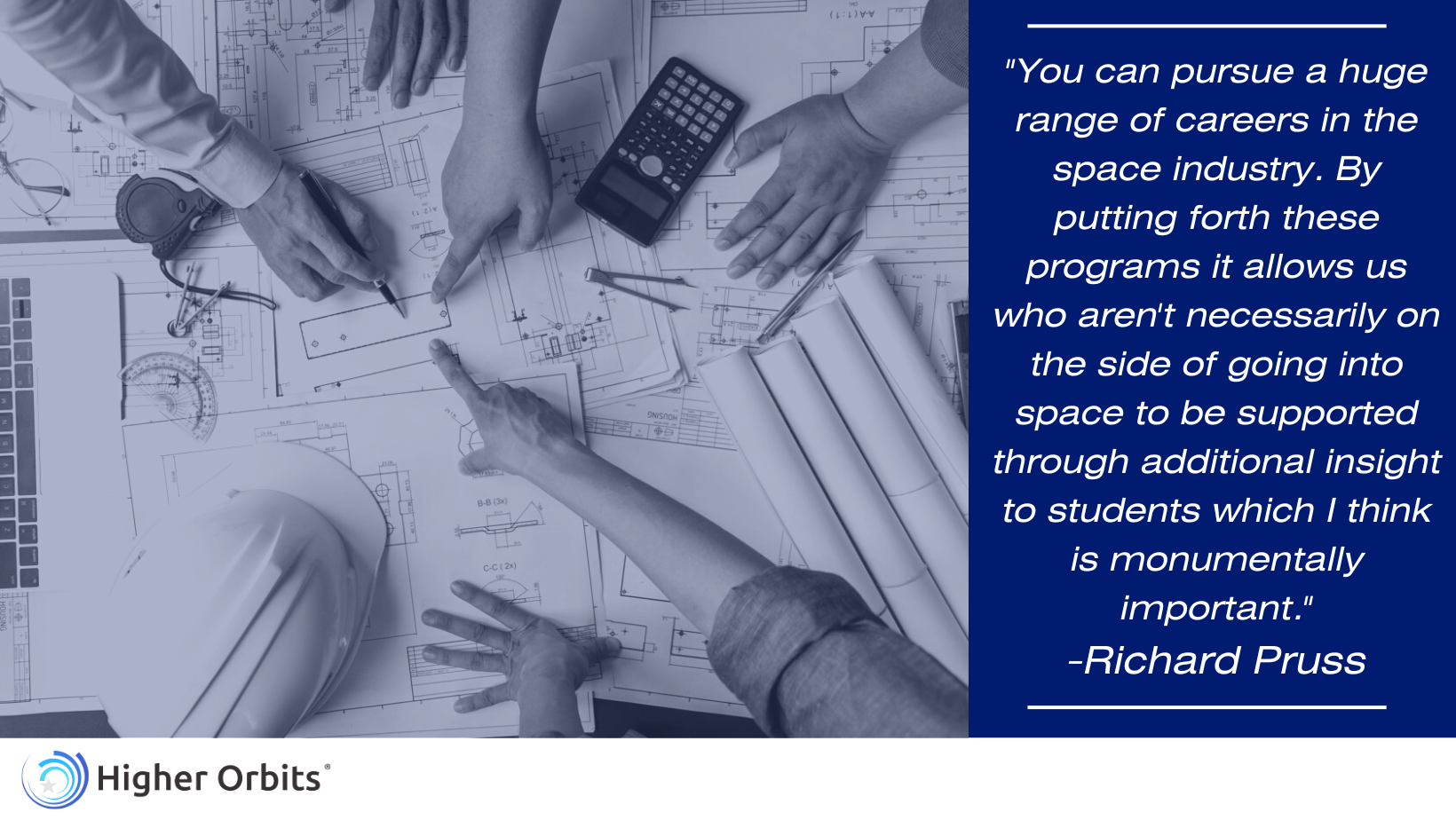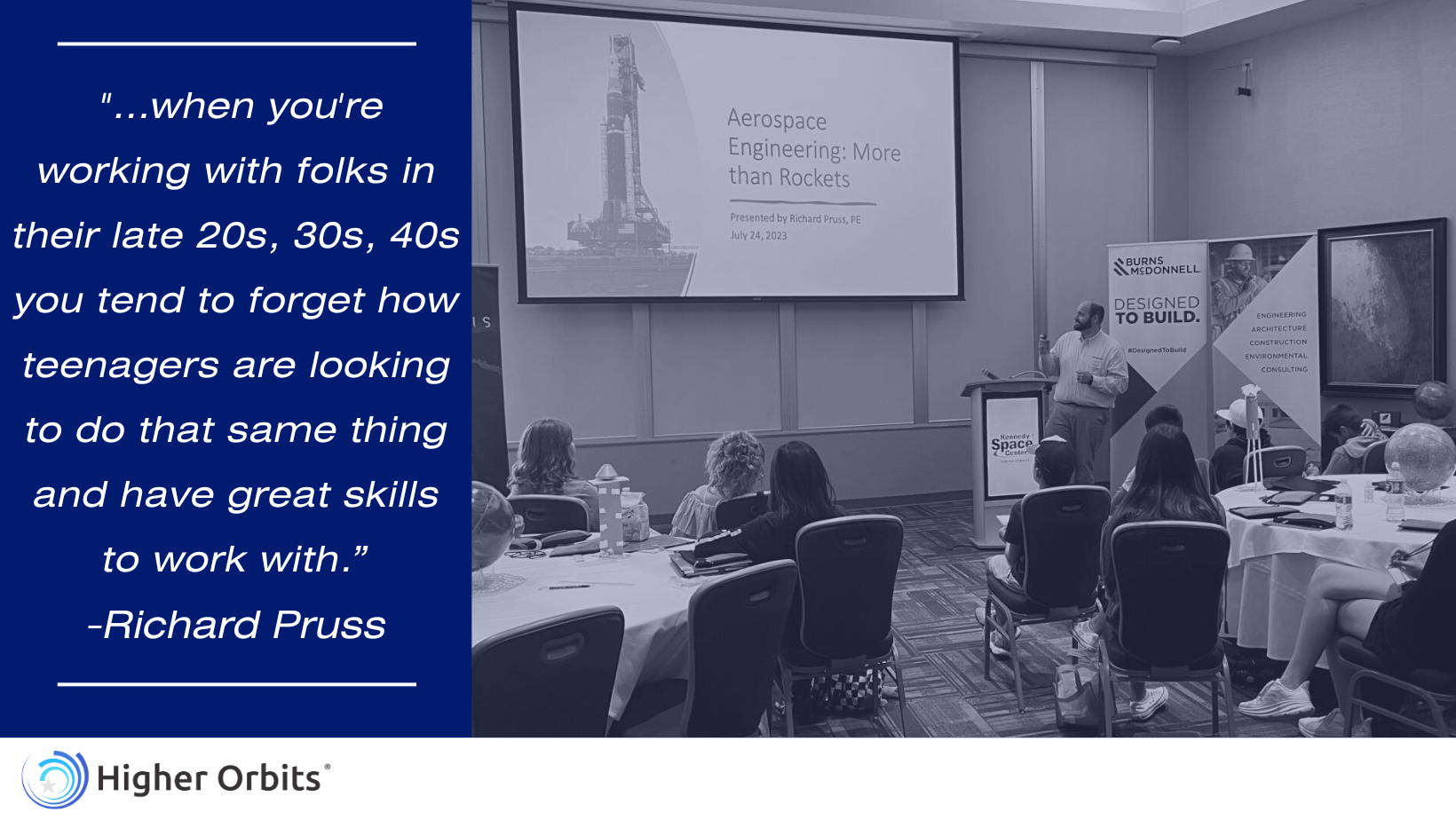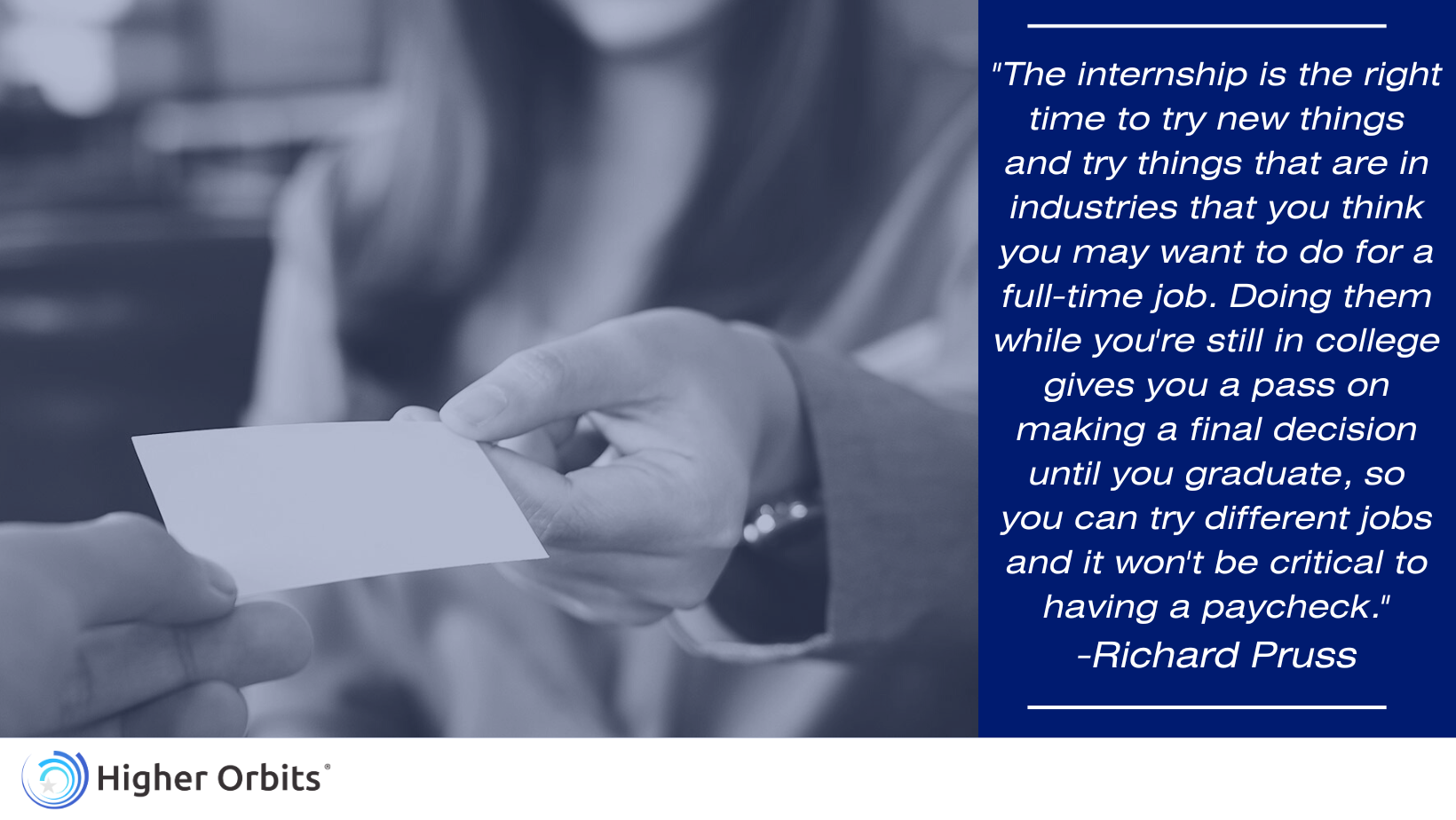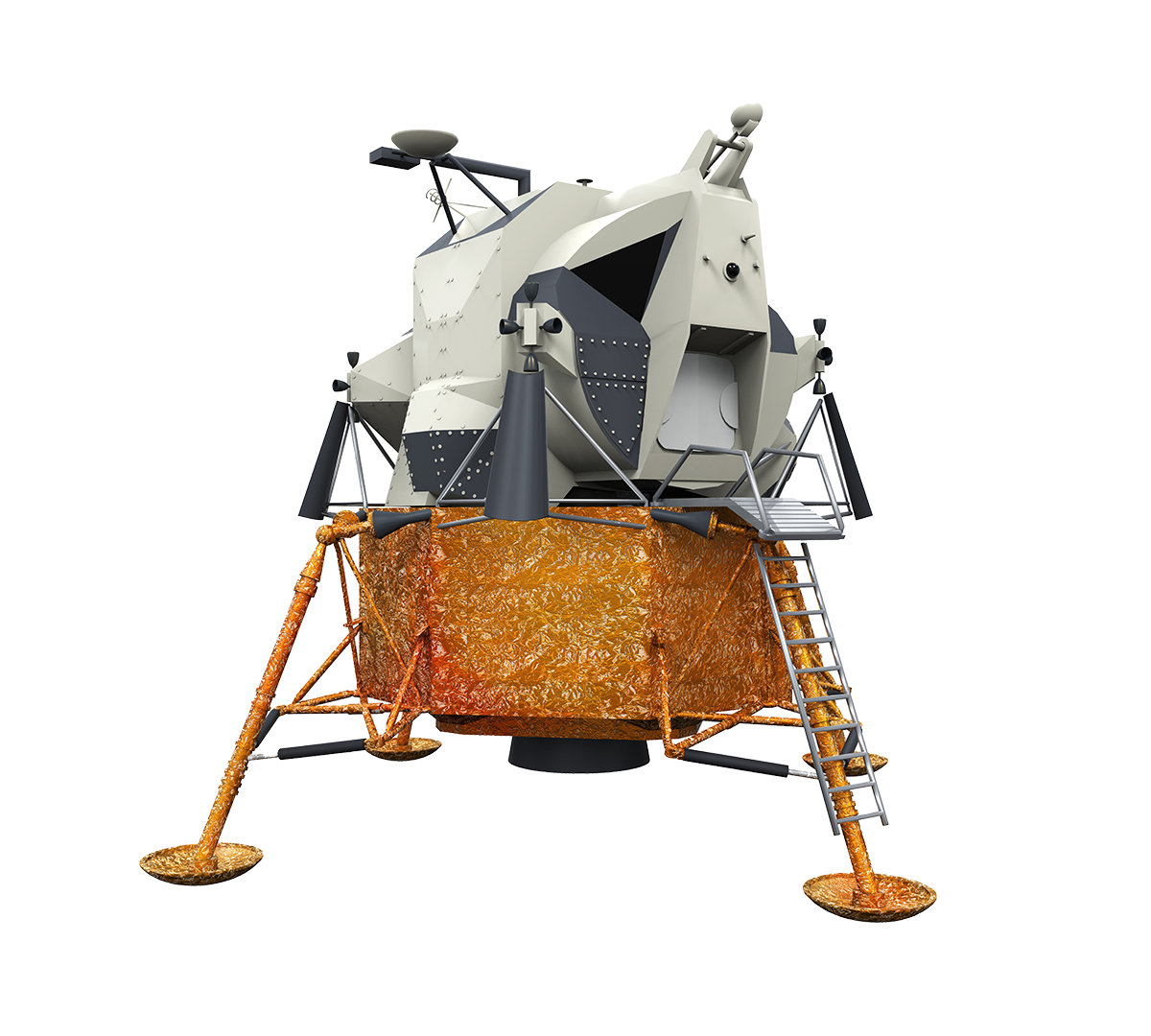As Higher Orbits has grown as an organization we have been fortunate to expand our leadership to introduce new members from all across the STEM industry. The Board of Directors is an essential establishment to an organization that aids in decision making, planning, and progressing the mission. This year, our new additions have brought Richard Pruss onto the Higher Orbits Board of Directors! Richard Pruss began his engineering career after earning his degree in 2006. He has worked applying his skills in civil and structural engineering, acted as a program manager and director in the aerospace industry, and now continues to work as a Regional Global Practice Manager at Burns & McDonnell which provides engineering, architecture, construction, environmental, and consulting solutions. With his extensive experience in the engineering industry he offers a unique perspective on STEM as a structural engineer working in the aerospace industry. In addition to gaining an experienced leader and collaborator to the Board of Directors, having diverse perspectives within the aerospace industry on the leadership team helps Higher Orbits to expand its range of careers to introduce to students. In an interview with Richard Pruss he discusses what drew him to his present position, the leadership and character qualities that helped him throughout his career, and his advice for students looking to enter the STEM industries as professionals.
What initially inspired you to join the Higher Orbits Board of Directors?
“I've always liked what Michelle Lucas was doing with Higher Orbits. I'd heard about it several years ago and wanted to get engaged and involved. I thought it was a great approach to help bring STEM to a wider market, and with my position in leadership in the company at the time where recruiting was a big role.”
Pruss reflected on his time recruiting new engineers. The decrease in applicants especially outside environments with exposure to the space industries startled him. After being introduced to the Go For Launch! programs Pruss said, “It was seeing that she's putting on these events all over the country and incorporating schools that may have been where STEM-type focused education isn't really a thing. I thought that was a great program in general, and wanted to be able to provide more help than just sponsoring something.”
Higher Orbits is always looking to expand the amount of opportunities in STEM that we can to students at our programs. On this, he discussed his excitement saying, “I also wanted to be able to provide a look into the launching side of the space facilities world where it's not going up but it's the other components of getting the rocket itself through fabrications and integrations. I thought it would be an additional avenue outside of the traditional launch ideas which we've seen more of an interest in.”
His passion for the Higher Orbits mission shined through as he continued, “You can pursue a huge range of careers in the space industry. By putting forth these programs it allows us who aren't necessarily on the side of going into space to be supported through additional insight to students which I think is monumentally important. I think sometimes people get pigeon-holed into one specific area and just need to expand their interests.”
You have been on the Board for five months now. What are some of the things that stand out to you in your experience with Higher Orbits?
Richard Pruss joined the Higher Orbits Board of Directors in April of 2023. He reflected on his time saying, “I think it's been how Michelle really looks to us to help her. It's not, 'Here's what we're going to do, let's vote on it,' instead it's 'Here's our challenge. What can we do as a collective organization here?' And it's not just about raising money, we're discussing what we can do from a diversity and inclusion side and trying hard to market and expand the reach of this beyond the traditional nonprofit form of just going out and raising money.”
Richard Pruss discussed his gratitude for the collaborative style of Higher Orbits’ Board of Directors highlighting, “She wants us to have ideas, participate, and help things be successful which I really appreciate. Sometimes you get people who are on a Board of Directors who have an agenda and they're not really listening to others, especially people that are on the leadership team which doesn't help things get done. I really appreciate that we all have a voice to help her take what she started with her creativity and her passion and help by using our own specialties to bring it to the next level.”
Pruss discussed his personal preference for a collaborative work style and the satisfaction of being a part of the dynamic group that already incorporated this principle. He expanded on his respect for the work CEO and Founder, Michelle Lucas, has done creating this organization explaining, “To be a leader and help growth you really have to do it as a team down in the weeds with the work. We all know that she is incredibly hands-on and she's putting on touches through personally leading while still going to Australia and other conferences. It's not just about tasks, it's really her, and I think that's a really good model for leading teams and building success. She shows that by getting in there, supporting from day one, and showing everyone that no one is better than anyone else on the team. She really embodies that with what she's doing with the Higher Orbits Board in the short time that I've been on the Board attending meetings and working on other collaborations. She's done a great job bringing on people who are passionate about growing space, growing education, and growing opportunities for students across the company to get into a market that they may not have known they could get into to see that there's more than just trying to be an astronaut.”
You recently participated in-person at Go For Launch! Space Coast 2023. How does seeing the program in action and participating impact you?
At Go For Launch! Space Coast 2023, Richard Pruss gave a fantastic talk to students about some of the work that he had done in his career and some areas for students to consider. After this experience he said, “I think it's been seeing how smart kids and teenagers are these days! The type of programs they're learning in school and how that interacts with everything. They come across as a lot smarter than teenagers used to be. I just feel like they seem smarter than I was when I was in highschool. Seeing that tug of interest in space was amazing.”
This event was the first Go For Launch! event that Pruss was able to attend! He was impressed by the dedication of the students, with some flying in from across the country to attend the event and learn about new opportunities. He described interacting with the groups during activities saying, “You can see from observing them which student is probably going to assume a leadership role just through how they step in and take charge but are still very collaborative.”
At the event students participated in activities and developed their team experiments together. This required time management, communication, and leadership abilities of all students. Seeing this engagement from the group of passionate students, Pruss commented, “I thought that it was amazing to see that. We always talk about that in general when you're building teams on the professional side. Getting a chance to see students, young adults, do it when they’re not being told to do it is really great. Their mindset is more of a collaborative approach, so you can have your type-A personalities that come in and take charge, but that's what happens with most teams. It was just really cool to see that and experience it, and when you're working with folks in their late 20s, 30s, 40s you tend to forget how teenagers are looking to do that same thing and have great skills to work with.”
What initially inspired you to work in the STEM industries?
Reminiscing on his childhood and education, Pruss said, “Growing up, my dad would always say to make sure to get an engineering degree because it would keep me covered forever. That's how I was initially drawn to it. Then, in my high school in New Jersey we were near Johnson & Johnson who had a big manufacturing plant area that sponsored the first robotics program and some of the other STEM-type programs within the school that were involved with Computer Aided Design (CAD). We had CAD classes where we could learn to use AutoCAD and 3D CNC Milling.”
He described the interest that the access to computer and design focused classes built in him, saying, “In the late 1990s to early 2000s it was the big thing that computers were being integrated, so these educational initiatives were started which got me into types of programs. Then my high school offered some architectural drafting classes and legacy-type courses that I was able to take part in.”
Exposure to the project style of STEM based projects helped Pruss narrow his fields of interest. He explained, “I enjoyed doing the CAD work and working with computers and seeing it turn into 3D models. Using computers a lot growing up was one thing, but that wasn't really on the level of learning it with a project goal and workload in school which was extremely beneficial. It was great to see what else you could do with computers besides play video games.”
Later, he detailed his path to civil engineering recalling, “When my brother, who is a mechanical engineer, was looking to go to college we met with one of the faculty leads from the civil engineering group and after hearing what he was talking about I thought it was really cool to work on buildings and foundations. So I took more to the civil engineering field and looked more into the structural engineering branch.”
You had incredible experiences working as an engineer, program director, and manager. How has your experience in the working world influenced your motivation on promoting STEM careers to the younger generation?
On this, Pruss responded, “I think the biggest thing has been seeing the lack of people available. You go to career fairs, look at resumes, and try to grow teams and you see that other companies are trying to do the same things. Then after a couple years people start jumping around. Knowing we have a shortage of engineers and architects out there for all the different design disciplines and trying to work with clients in the aerospace industry when you know that they are short on people to do that hand manufacturing and assembly of components the question becomes: ‘What can you do?’”
Realizing this need in the STEM industries, Pruss elaborated, “Once you're in the industry you see the reports of new graduates going down and forecasts of retirees leaving. In certain areas they are better about promoting it where you have that very space-centered base, but that's limiting it to a certain geographical area not allowing it to go to all states which opens it up a lot more. The general shortage of engineers coming out of schools has been a big motivator for me to build up support.”
Having worked with teams in different settings across many highly technical fields, what are some qualities or habits that you would encourage students to focus on so they can develop into effective workers in the future?
He considered this question and concluded, “I think a big thing is communication. Everyone says engineers are awful at communicating, which can be a personality flaw with some engineers, especially in specific disciplines that always have this preconceived notion that this type of engineer is just going to be an introvert. That lets them not work with the team and only focus on one thing. They need to be able to communicate effectively across all types of personalities, introverts or extroverts or anything in between.”
Teamwork is a necessity in the working world, and communication issues can hinder entire projects. Speaking to the necessity for communication skills Pruss continued, “I think they don't talk enough about the soft skills when you're in high school, and being an effective communicator is the piece to really work on as well as being a good listener. You can teach anyone to solve a technical problem, but getting comfortable in a team expressing ideas is one of the biggest lacking skills which is kind of true across the industry. Being able to feel comfortable in a team, being confident in what you think is a good approach, and being able to give and take constructive feedback and not shut down is part of the overall skill set students coming into STEM fields really need to work on. You can be a great engineer, but if you're a difficult person to work with or you can't take constructive criticism then people aren't going to want to work with you as an engineer.”
“Maybe throw in some Communications classes in college as an engineer,” he recommended. “It could be helpful!”
What are some keys to your personal leadership style that you would highlight and have worked for you?
Considering his leadership journey, Richard Pruss explained, “As I've evolved as a leader, I’ve worked on being collaborative with the team and not just dictating what to do. Working with the team, laying out the vision, and collaborating together has been best to make things successful.”
He described how he liked to take an active leadership role and help in any way that he can. He expanded on this saying, “With all of the different leadership styles out there everything is moving toward the servant-leadership approach. I've never felt that there was a task that was beneath me. Being able to show that dedication as a project manager and working there late hours with the team(even if there is time that you aren't working) it's important just being there with the team. It's important and shows your involvement with them. I also remember the mantra 'Don't praise in public then criticize in private.' It's important to be constructive. You can't always give a compliment sandwich where it's 'good-bad-good,' but always at least try to offer the good and the bad to try to help them. Work with them and try to understand.”
What encouragement would you give to students who are interested in STEM but unsure of how to pursue their interests professionally?
Pruss highlighted the importance of searching for opportunities such as internships to get a better idea of a career path in a lower-stakes situation than a full-time position. He elaborated, “The internship is the right time to try new things and try things that are in industries that you think you may want to do for a full-time job. Doing them while you're still in college gives you a pass on making a final decision until you graduate, so you can try different jobs and it won't be critical to having a paycheck.”
Drawing on his personal experience searching for internships, Pruss said, “I think it's good to take advantage of internships as early as possible. I was able to get an internship after my freshman year because I used CAD software very well. I got a job with a small CAD firm helping cater shop drawings for steel bridges. It was something where they really needed some help and said they could get me in the door even though I was a freshman when typically you don't get internships until junior or senior year. That was a great opportunity to try things out and get into the workforce. I did that over the summer and then I stuck with them during college doing part-time work.”
He encouraged students, “Do internships and figure out where there are jobs. You can look where you are, but don't be afraid to look across the country because the time to do it is when you're in college. It's much better instead of graduating with a degree and then getting into a situation trying six different jobs in three years.”
Richard Pruss’ direction to help expand the career options that Higher Orbits can introduce to students is a wonderful complement to his great leadership influence with the Board of Directors. With excellent perspective within the structural and facilities areas of aerospace and engineering, Pruss enters the Higher Orbits Board as a great asset and an example for students of the vast world of careers in aerospace and engineering. With Pruss on the Board of Directors, Higher Orbits is excited to move forward and collaborate to reach new heights!
